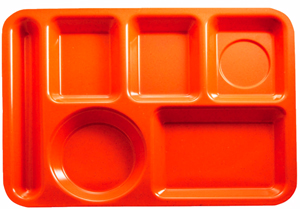Going trayless in cafeterias — a mixed outcome
Submitted on
I said in a recent post that there is very little black and white, compared to all the gray of decision-making, and here’s another example.
Brian Wansink and David Just do some interesting research at the Cornell University Food and Brand Lab, and the finding in this report is that cafeterias, in schools and otherwise, ditch their buffet trays, the victim is often salad at the expense of dessert.
 One reason many cafeterias have gone trayless is to reduce energy use (repeatedly cleaning all those trays), to which Just and Wansink add a desire to cut down on food waste: People are less likely to take food they’re not going to eat when it’s easier to carry.
One reason many cafeterias have gone trayless is to reduce energy use (repeatedly cleaning all those trays), to which Just and Wansink add a desire to cut down on food waste: People are less likely to take food they’re not going to eat when it’s easier to carry.
But when they went to a college cafeteria to test what happens when trays are taken away, they found that if forced to choose among making multiple trips, or leaving something at the expense of something else.
Students were more reluctant to take a salad, as 18.3% fewer students took salads on the trayless day than the students on the normal day. Without trays, many patrons tried to compensate for having fewer items on their trays by taking more of the few items they took. Because of this students were less likely to eat all of their entrée (38.8% vs. 85.7%), salad (53.6% vs. 91.7%), or dessert (52.7% vs 90.7%)—though the amount of dessert remaining was insignificant.
So not only did it not cut down on food waste, it altered food choices for the unhealthier. Getting rid of the trays seems like a good idea, from the energy perspective. So this is just another example that few matters are black and white, that the color of most decisions in gray.
- Read more about Going trayless in cafeterias — a mixed outcome
- Michael's blog
- Log in to post comments